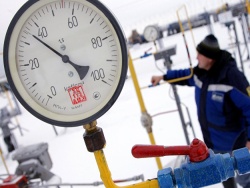
Until the first crisis in 1974 the price of oil has established consumer countries. Thus, in the postwar years per barrel consistently gave 1 dollar, despite a steady increase in demand of 6% per year. Then, after 1974, the pictures passed into the hands of producers, in particular through the OPEC quota. Be that as it may, since the beginning of 2000-ies of the black gold increasingly obeys the law of supply and demand. So, from late 2014 to late 2015 quotes fell from $ 110 per barrel to less than $ 30.
This dramatic price collapse is associated with the reduction of demand due to a tangible slowdown in the world economy (primarily in China and India), as well as the abundance of deals with the unexpected emergence of American shale oil. In this environment, OPEC, whose members are in different economic situation (this applies to the cost of production, and is required to balance the budget of the price level) and hold diverse views on geopolitics, failed to negotiate reduced quotas.
As a result, oil prices today depend to a greater extent from 6 million barrels a day of U.S. shale oil, 30 million barrels of OPEC. Due to this flexibility in the coming years, American fuel will play the role of the “petroleum pendulum”, providing the price fluctuations in the range of from 30 to 70 dollars. The more that countries such as Iraq, Syria and Libya is now producing less than they could. Their return to the market could expand the already rich offer, without giving prices in the medium term to rise above $ 70 dollars.
Low prices, as you can guess, cause anxiety-producing countries, which, for the most part, can not boast of a diversified economy. In such circumstances, the oil monarchies led by Saudi Arabia are playing a double game. First of all, they want to kneel the American shale oil industry, the production of which costs significantly more expensive. In addition, the Saudis seek to weaken the historic Shia enemies in Iran and Syria.
Although the price of a barrel to 30 dollars to balance the budget Wahhabi Kingdom is quite far away, it can still hold out some time due to accumulated reserves, about $ 800 billion. However, due to the Domino effect of the collapse of prices brings balance to major exporting countries like Algeria and Nigeria, where oil rents allowed to buy public peace. The economic situation is close to disaster, and the discontent is growing. For already rooted in Libya, the Islamic state, the destabilization of the whole of Algeria would be a great opportunity to spread throughout North Africa.
Many believe that the decline in oil prices poses a threat to the reforms in the energy sector and could slow down investment in renewable energy. However, this is only a myopic simplification, because oil is mostly finds application in transport, but is not practical (less than 5%) to produce electricity (there main competitors are coal, gas, nuclear energy and renewable sources). The drop in the price of oil washes to enhance the competitiveness of gas (its price is indexed depending on the quotes of black gold) in relation to coal and nuclear energy, which will accelerate energy transformation and movement toward models with low emissions of greenhouse gases.
In such circumstances, the development of renewable energy based on the gas (emit two to three times less carbon dioxide than coal) as an intermediate tool. At the same time, cheap fuels can make to forget about saving and to push the demand up. It is not excluded that it will hit and market electric and hybrid cars that more expensive equipment with a gasoline or diesel engine. To influence the decision of consumers here will be able only incentive tax system.
In 2014 Europe paid for the oil more than 300 billion euros. Thus, the decline in prices offers a real opportunity for European production. We are talking about the competitiveness of energy-intensive industries such as automotive, metallurgy, petrochemicals, glass and cement industry, as well as transport and fishing. This can lead to a rise in investment and creating new jobs in areas suffering from unemployment for the last 15 years.
Only here the low prices of oil significantly affect the performance of some sectors that are directly related to exploration and production of oil. And although France itself is not producing hydrocarbons, it has okolonogteva industry with global reputation and prestigious brands such as Vallourec, Technip and CGG.
On the sector with a turnover of 40 billion Euro accounts for 70 000 employees worldwide. And last year the list of orders for this pride of the French industry is shrinking like shagreen skin.
In other words, not all the decline in oil prices — good news!








